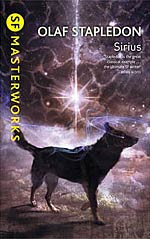
![]() Bormgans
Bormgans
5/19/2017
![]()
(...)
I have to admit I was charmed by the fact Stapledon chose to stress the corporeal nature of the dog, and writes about a bodily intelligence - not some detached soullike mind. But it quickly contrasts with all the talk about the spirit, and ultimately the novel is not about a human mind in a dog's body, but about an ultra-smart dog with language capacity raised partly as a human, not fitting in human society.
The book's theme might seem original, but on closer inspection isn't at all. The main conflicts in the protagonist's mind are simply those of Frankenstein's monster. What might be called homage by some actually amounts to theft. Like the monster, Sirius ponders why he was created. Like the monster, Sirius wants a mate that is like him. Like the monster, Sirius feels lonely in the world of men. Like the monster, Sirius feels unacknowledged. And like the monster, he kills in a rage of self-defense.
While Frankenstein's monster is tragic and believable, the dog not only manages to write a letter, but folds it in an envelop, puts on a stamp and posts it. All by himself. The epistolary effort is not portrayed as easy--Stapledon goes to some lengths to describe the practical inconveniences of having no hands--but still, Sirius is a "super-super-sheep-dog", so there you have it. He also gets the girl--spoiler, oops--and at the end there's some strange passages in which the girl's husband--that narrator novelist--discusses the dog having sex with her--I'm sure the essential, quintessential "spirit" of this novel.
(...)
Please read the full review on Weighing A Pig...
https://schicksalgemeinschaft.wordpress.com/2017/05/19/sirius-olaf-stapledon-1944/